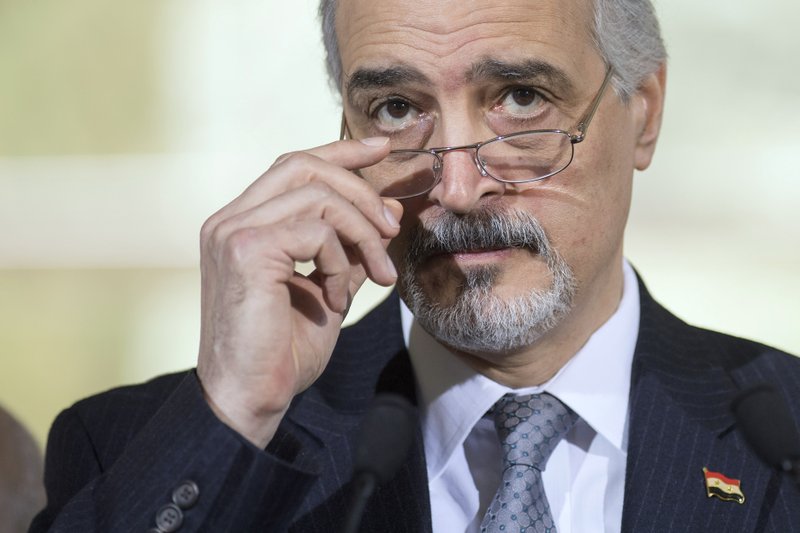BEIRUT -- At least 18 people were killed Friday when airstrikes hit several rebel-held neighborhoods in Syria's contested northern city of Aleppo, anti-government activists said, an escalation that placed added strain on a fragile cease-fire.
Aleppo, Syria's largest city and former commercial center, has seen sporadic clashes since the cease-fire took effect in late February, as government troops have advanced, boxing in opposition-held areas from all sides except for a corridor from the northwestern edge of the city.
The Britain-based Syrian Observatory for Human Rights said at least 19 people were killed in the airstrikes in Aleppo's Bustan al-Qasr neighborhood and other parts of the city controlled by rebels. The Observatory described the series of airstrikes as the most intense on the city since the cease-fire began. The Local Coordination Committees, an activist-operated media outlet, said at least 18 people were killed.
The February cease-fire has been teetering as violence rises, and United Nations-brokered talks in Geneva to resolve the conflict have bogged down, with the Saudi-backed opposition delegation recently suspending its participation.
The Higher Negotiating Committee, which represents most of the opposition at the U.N.-brokered talks, accuses the government of repeatedly violating the U.S.- and Russian-brokered cease-fire, illegally detaining thousands of people and blocking humanitarian aid access.
France's foreign minister, Jean-Marc Ayrault, warned that the negotiations over Syria's political future have entered a "danger zone."
Speaking with reporters in Paris, he said humanitarian access to besieged areas "must be total" and that there have been "too many fetters."
The Syrian government's envoy to peace talks in Geneva, Bashar Ja'afari, defended his government's record on humanitarian aid, criticizing the opposition for shedding "crocodile tears" about alleged lapses.
Ja'afari spoke to reporters at U.N. offices in Geneva where indirect peace talks and other meetings on Syria's crisis have been held in recent months. He said his delegation will meet with U.N. mediator Staffan de Mistura again on Monday.
De Mistura, meanwhile, said the current round of talks will continue until "probably Wednesday, as originally planned." But he said the two sides are "extremely polarized" and the cease-fire is in trouble.
Syria has said opposition calls for Assad, 50, to leave the office he has held since 2000 are a "red line." The Syrian leader is offering opposition figures whom he considers acceptable a limited role in a national unity government.
"The cessation of hostilities is still in effect, but it is in great trouble if we don't act quickly," de Mistura told reporters in Geneva on Friday. "It can definitely get back on track, but it will require urgent efforts." He added that the situation in Aleppo has become "very worrisome."
De Mistura told reporters the hobbled peace process needs support from a group of countries known as the International Syria Support Group, led by the U.S. and Russia, and called on that body to reconvene at the ministerial level.
"Neither of the two sides believe they will ever have a military victory, so it is time to talk," De Mistura said.
The envoy also took issue with the government's claim that it was not besieging any towns or villages. He said the international community counts 18 priority besieged areas in Syria: 15 by the government, two by the armed opposition, and one by the Islamic State.
De Mistura acknowledged that his estimate -- made on Swiss TV a day earlier -- that Syria's five-year war had taken 400,000 lives was "not verified." The U.N. stopped officially counting the toll at an estimated 250,000 dead several months ago, insisting lack of access prevented the collection of accurate figures.
Also Friday, a government plane crashed southeast of Damascus, and an Islamic State website said the extremist group, which operates in the area, downed the MiG-23. There was no immediate comment from the Syrian government.
Elsewhere, Syrian government forces and Kurdish fighters were clashing for a third day in the northeastern city of Qamishli, with at least seven people killed. Lezkin Ibrahim, a Kurdish media activist in Qamishli, said the fighting Friday was concentrated in the city center, forcing residents to stay indoors and shops to close.
He said Hawar news, the outlet where he works, has recorded 10 civilians and six Kurdish fighters killed. He said the wounded are being taken to neighboring towns for treatment because local hospitals are blocked by the fighting.
The Observatory, which monitors the conflict through activists on the ground, said the clashes killed seven, including a child and a woman.
Kurdish forces, who have carved out a zone of semiautonomy in northern Syria, seized the Alaya prison in Qamishli on Thursday after government forces inside it surrendered.
Ibrahim said the fighting started after government forces attacked a Kurdish security patrol, killing two of its members on Tuesday. He said the government shelled the city for the first time, and government helicopters flew over the city on Friday.
Information for this article was contributed by staff memers of The Associated Press and by Henry Meyer, Dana Khraiche and Toluse Olorunnipa of Bloomberg News.
A Section on 04/23/2016

